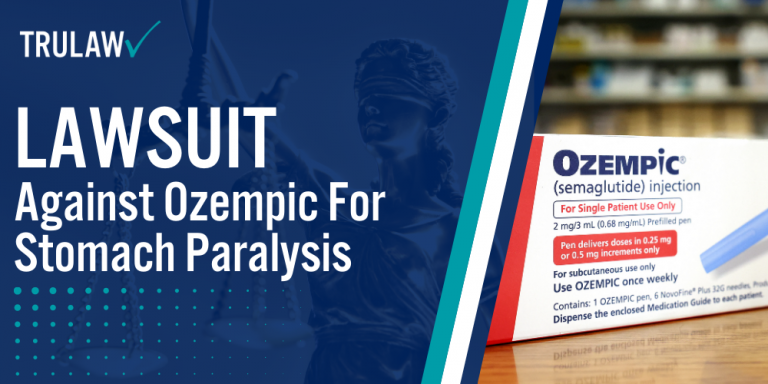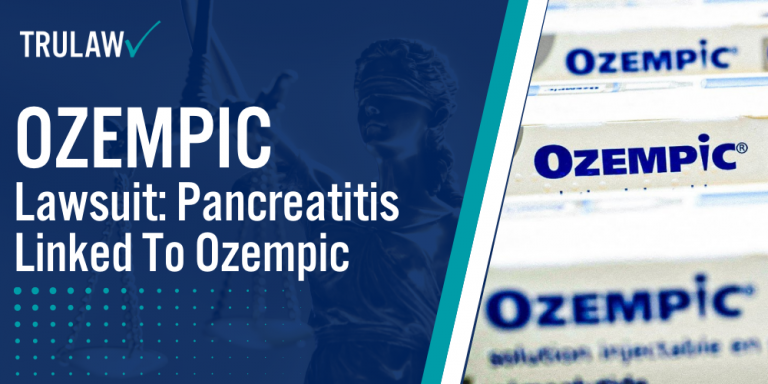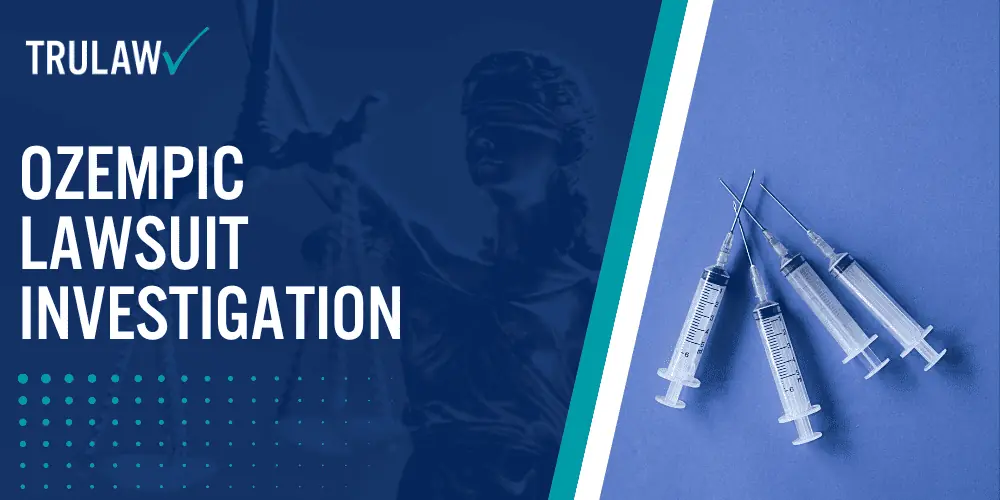Semaglutide Lawsuit Filed Against Ozempic & Wegovy Makers
- Last Updated: October 17th, 2024

Attorney Jessie Paluch, founder of TruLaw, has over 25 years of experience as a personal injury and mass tort attorney, and previously worked as an international tax attorney at Deloitte. Jessie collaborates with attorneys nationwide — enabling her to share reliable, up-to-date legal information with our readers.
Legally Reviewed
This article has been written and reviewed for legal accuracy and clarity by the team of writers and legal experts at TruLaw and is as accurate as possible. This content should not be taken as legal advice from an attorney. If you would like to learn more about our owner and experienced injury lawyer, Jessie Paluch, you can do so here.
Fact-Checked
TruLaw does everything possible to make sure the information in this article is up to date and accurate. If you need specific legal advice about your case, contact us by using the chat on the bottom of this page. This article should not be taken as advice from an attorney.
Overview of the Semaglutide Lawsuit
On this page, we’ll discuss an overview of the Semaglutide Lawsuit, patient experiences of adverse effects reported in the Semaglutide Lawsuit, potential Semaglutide lawsuit settlement values, and much more.
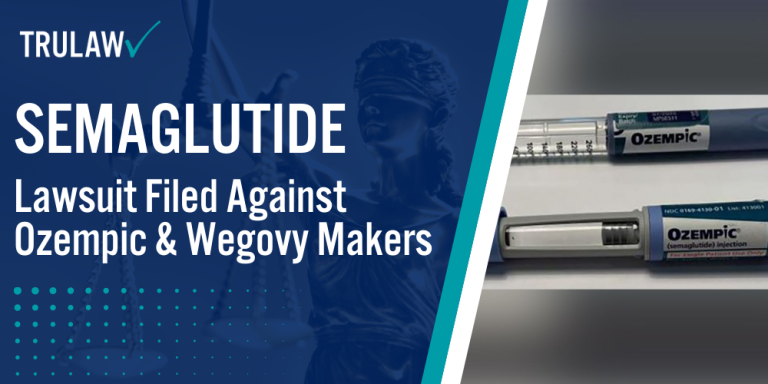
Intro to the Semaglutide Lawsuit
The goal of many plaintiffs in the semaglutide litigation includes:
- Attaining compensation for medical costs
- Coverage for lost wages due to illness
- Potentially motivating improved transparency and safety in pharmaceutical practices
If you or a loved one used Ozempic, Wegovy, or compounded versions of these drugs and subsequently developed gallbladder disease, stomach paralysis (gastroparesis), cyclic vomiting syndrome, or other related health problems, you may be eligible to file an Ozempic Lawsuit claim.
Contact TruLaw for a free consultation.
You can also use the chatbot on this page for an instant case evaluation.
Table of Contents
Overview of Semaglutide Lawsuits: TruLaw
Semaglutide, a medication primarily used for the treatment of type 2 diabetes, has been under legal scrutiny due to various health concerns.
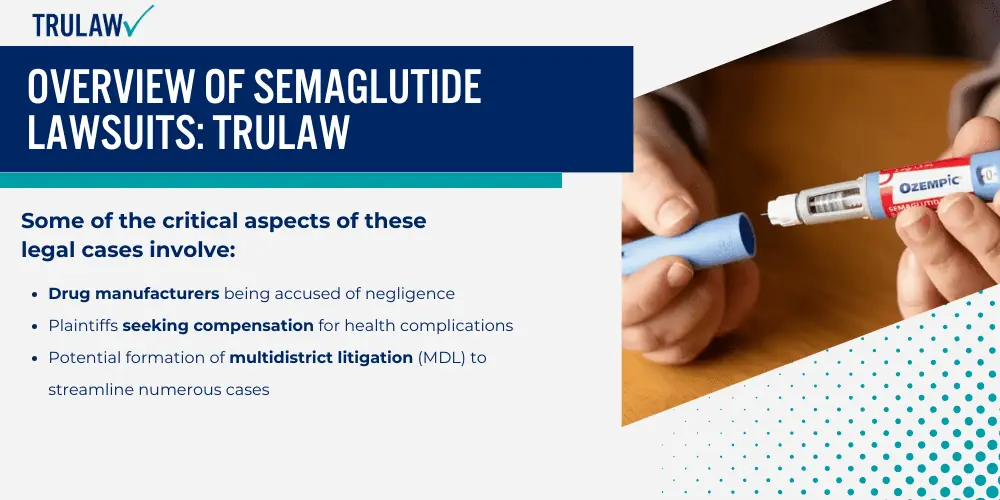
Many users have filed lawsuits claiming adverse effects from its use, and as such, semaglutide lawsuits are becoming more notable in the judicial system.
These suits often focus on the claim that drug manufacturers failed to warn patients about the potential risks associated with the medication.
The legal actions usually involve:
- Allegations of serious side effects
- Failure to provide adequate warnings
- Seeking compensation for damages
The primary medication under debate is Ozempic, a brand that operates under the umbrella of semaglutide-based treatments.
Legal claims revolving around Ozempic lawsuits are typically filed by individuals who have experienced significant health issues that they attribute to the medication’s use.
Some of the critical aspects of these legal cases involve:
- Drug manufacturers being accused of negligence
- Plaintiffs seeking compensation for health complications
- Potential formation of multidistrict litigation (MDL) to streamline numerous cases
Should the number of lawsuits grow substantially, the judicial panel may consolidate these cases in a federal court to manage the litigation more efficiently.
This action aids in resource conservation and helps maintain consistent rulings across similar cases.
Implications for Novo Nordisk with Ozempic's Role in Public Health
Novo Nordisk’s development of Ozempic marks a significant advancement in treating type 2 diabetes.
It showcases the company’s leadership in diabetes care and expanding focus on broader public health concerns.

Advancements in Diabetes Management
Novo Nordisk’s offers a new avenue for diabetes treatment:
- Ozempic represents a breakthrough: Its efficacy in lowering blood sugar levels and aiding in weight loss has been well-documented, providing patients with a powerful tool in managing type 2 diabetes.
- Patient-centric solutions are at the forefront of Novo Nordisk’s mission: By focusing on medications that offer both efficacy and convenience, Novo Nordisk enhances the quality of life for those with chronic conditions.
Novo Nordisk’s Commitment to Public Health
The company’s role extends beyond medication development to encompass a broader commitment to public health challenges:
- Ozempic’s impact on public health is significant: By addressing two major concerns in diabetes care—glucose control and weight management—Ozempic contributes to the overall well-being of individuals with type 2 diabetes.
- Innovation and patient education are key: Novo Nordisk invests in research and development and educates patients and healthcare providers about the effective management of diabetes, emphasizing the importance of a holistic approach to care.
If you or a loved one used Ozempic, Wegovy, or compounded versions of these drugs and subsequently developed gallbladder disease, stomach paralysis (gastroparesis), cyclic vomiting syndrome, or other related health problems, you may be eligible to file an Ozempic Lawsuit claim.
Contact TruLaw for a free consultation.
You can also use the chatbot on this page for an instant case evaluation.
FDA Approval and Regulatory Oversight
The FDA plays a critical role in approving medications like Semaglutide and monitoring their safety post-approval through the assessment of adverse event reports.
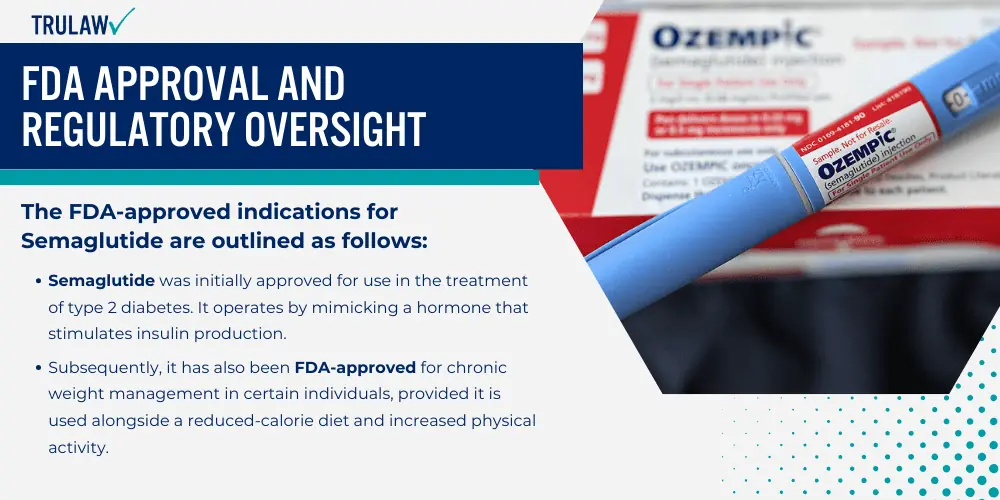
FDA Approved Indications
The FDA-approved indications for Semaglutide are outlined as follows:
- Semaglutide was initially approved for use in the treatment of type 2 diabetes. It operates by mimicking a hormone that stimulates insulin production.
- Subsequently, it has also been FDA-approved for chronic weight management in certain individuals, provided it is used alongside a reduced-calorie diet and increased physical activity.
Regulatory Response to Adverse Reports
Regarding the regulatory response to adverse reports concerning drugs like Semaglutide, the key points are:
- Following approval, the FDA continuously reviews safety data. Adverse event reports are critical for this ongoing process.
- If concerning patterns emerge, the FDA may take actions such as requiring changes to a drug’s labeling, issuing safety communications, or withdrawing approval in severe cases.
- The agency has added warnings to the labels of FDA-approved Semaglutide medicines, informing healthcare providers and patients about the potential risks identified through such reports.
Patient Experiences and Adverse Effects in the Semaglutide Lawsuit
Recent lawsuits highlight critical concerns surrounding Semaglutide.
A subset of users report severe gastrointestinal issues and long-term health complications associated with its use.
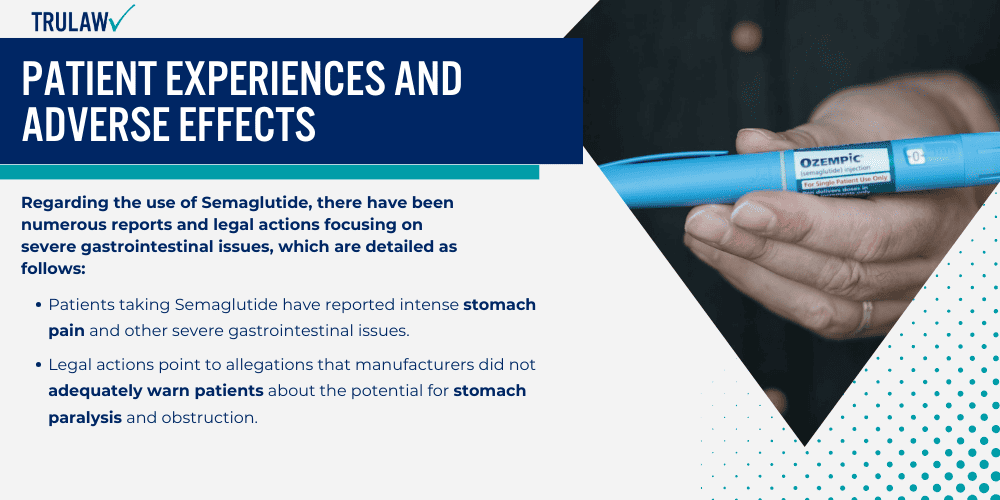
Reports of Severe Gastrointestinal Issues
Regarding the use of Semaglutide, there have been numerous reports and legal actions focusing on severe gastrointestinal issues, which are detailed as follows:
- Patients taking Semaglutide have reported intense stomach pain and other severe gastrointestinal issues.
- Legal actions point to allegations that manufacturers did not adequately warn patients about the potential for stomach paralysis and obstruction.
Long-Term Health Complications
The long-term health complications associated with Semaglutide include, but not limited to:
- Some users of Semaglutide have cataloged adverse event reports disclosing how the drug adversely impacted their health.
- Among the cited risks were not just short-term side effects but also concerns about long-term health implications due to sustained use of the drug.
In these cases, the prominence of severe side effects has been underscored, drawing attention to the balance between the benefits of Semaglutide in weight management and the gravity of potential health risks.
The Role of Compounding Pharmacies
Compounding pharmacies have come into the spotlight due to legal actions concerning the purity and authorization of their compounded drugs.
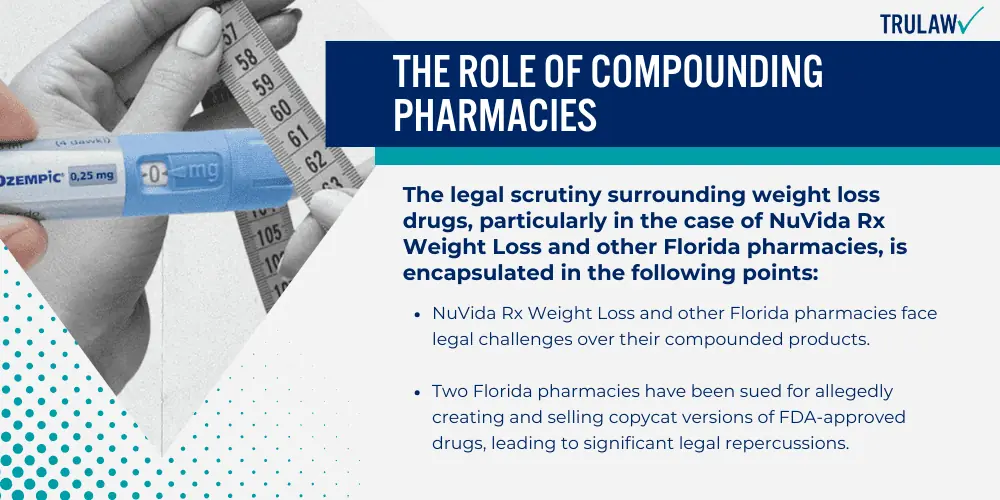
These pharmacies typically customize medications for individual needs, but recent events raise concerns about their operations and the substances they produce.
Legal Scrutiny of Weight Loss Drugs
The legal scrutiny surrounding weight loss drugs, particularly in the case of NuVida Rx Weight Loss and other Florida pharmacies, is encapsulated in the following points:
- NuVida Rx Weight Loss and other Florida pharmacies face legal challenges over their compounded products.
- Two Florida pharmacies have been sued for allegedly creating and selling copycat versions of FDA-approved drugs, leading to significant legal repercussions.
Investigation into Unauthorized Production
As for the investigation into unauthorized production of compounded drugs, the focus centers on:
- Authorities are investigating allegations that compounded drugs contain unknown impurities, which may pose health risks to consumers.
- The production of compounded versions of popular weight-loss medications without proper authorization has prompted these pharmacies to face scrutiny over the safety and legitimacy of their products.
Medicinal Efficacy and Therapeutic Use
Semaglutide is a prominent agent in the treatment of obesity and Type 2 diabetes.
It is recognized for its ability to regulate blood sugar and assist in long-term weight management.
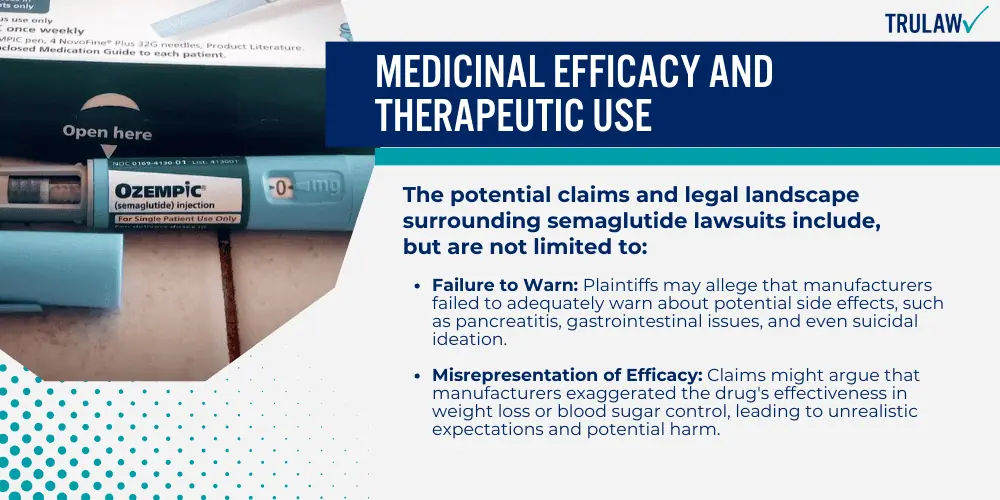
The potential claims and legal landscape surrounding semaglutide lawsuits include, but are not limited to:
- Failure to Warn: Plaintiffs may allege that manufacturers failed to adequately warn about potential side effects, such as pancreatitis, gastrointestinal issues, and even suicidal ideation.
- Misrepresentation of Efficacy: Claims might argue that manufacturers exaggerated the drug’s effectiveness in weight loss or blood sugar control, leading to unrealistic expectations and potential harm.
- Off-Label Marketing: Lawsuits could target the promotion of semaglutide for unapproved uses, potentially exposing patients to unknown risks.
- Unreasonable Risk of Injury: Plaintiffs might claim that the potential increased risk associated with semaglutide outweighs its benefits, especially considering off-label use or vulnerable patient populations.
FDA has received adverse event reports after patients used compounded semaglutide.
Patients should not use a compounded drug if an approved drug is available to treat a patient.
Additional challenges and considerations in the semaglutide lawsuits include, but are not limited to:
- Burden of Proof: Plaintiffs have the burden of proving their claims, which can be challenging due to complex legal and medical issues.
- Discovery Process: Extensive discovery procedures may involve reviewing medical spas, records, internal drug companies’ documents, and expert testimonies.
- Cost and Time: Litigation can be lengthy and expensive, requiring significant resources and patience from plaintiffs.
The FDA has reported that some compounders are using salt forms of semaglutide, such as semaglutide sodium and semaglutide acetate.
In April 2023, the FDA wrote to the National Association of Boards of Pharmacy, expressing its concerns with the use of salt forms in compounded products.
On October 10, 2023, the FDA sent letters to the National Association of Boards of Pharmacy and the Federation of State Medical Boards expressing similar concerns.
The letters also provide information about the circumstances under which compounded semaglutide products are allowed by law and make it clear that compounded drugs are not approved or evaluated by the Food and Drug Administration for safety and effectiveness.
Legal Proceedings and Case Reviews: Semaglutide Lawsuit
The Semaglutide lawsuit has become a focal point of recent pharmaceutical litigation, involving a complex web of legal actions and case reviews.
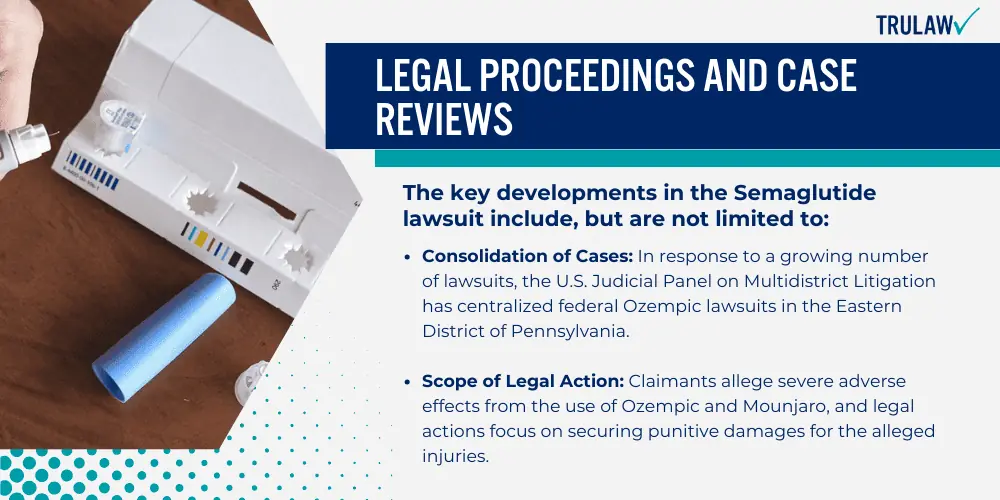
Claimants are coming forward with various allegations, leading to the consolidation of federal lawsuits and the scrutinization of compensation claims processes.
Semaglutide Lawsuit: Multidistrict Litigation
The key developments in the Semaglutide lawsuit include, but are not limited to:
- Consolidation of Cases: In response to a growing number of lawsuits, the U.S. Judicial Panel on Multidistrict Litigation has centralized federal Ozempic lawsuits in the Eastern District of Pennsylvania.
- Scope of Legal Action: Claimants allege severe adverse effects from the use of Ozempic and Mounjaro, and legal actions focus on securing punitive damages for the alleged injuries.
If you or a loved one used Ozempic, Wegovy, or compounded versions of these drugs and subsequently developed gallbladder disease, stomach paralysis (gastroparesis), cyclic vomiting syndrome, or other related health problems, you may be eligible to file an Ozempic Lawsuit claim.
Contact TruLaw for a free consultation.
You can also use the chatbot on this page for an instant case evaluation.
Frequently Asked Questions
-
What are the Novo Nordisk trademarks for their semaglutide products?
Novo Nordisk has various trademarks for semaglutide products, including well-known names like Ozempic® and Wegovy®, marking their treatments for diabetes and obesity.
-
What medications contain the active ingredient semaglutide?
Semaglutide drugs such as Ozempic® and Wegovy® contain semaglutide aimed at managing type 2 diabetes and aiding in weight loss for obesity treatment.
-
What legal actions have been taken regarding Ozempic side effects?
Lawsuits related to Ozempic have been filed by individuals alleging adverse side effects and seeking compensation for their experiences with the medication.
-
How is Ozempic used to treat obesity?
Ozempic leverages semaglutide to reduce appetite and calorie intake, facilitating weight loss in patients being treated for obesity.
-
In what ways is semaglutide used as a diabetes therapy?
Semaglutide, as a diabetes therapy, increases insulin release, thereby lowering blood sugar levels in individuals with type 2 diabetes.
-
What is the Ozempic Side Effects Lawsuit About?
The Ozempic side effects lawsuit centers on claims from patients who allege they experienced severe gastrointestinal issues, such as gastroparesis (a condition causing delayed stomach emptying), after taking Ozempic.

Experienced Attorney & Legal SaaS CEO
With over 25 years of legal experience, Jessie is an Illinois lawyer, a CPA, and a mother of three. She spent the first decade of her career working as an international tax attorney at Deloitte.
In 2009, Jessie co-founded her own law firm with her husband – which has scaled to over 30 employees since its conception.
In 2016, Jessie founded TruLaw, which allows her to collaborate with attorneys and legal experts across the United States on a daily basis. This hypervaluable network of experts is what enables her to share reliable legal information with her readers!
You can learn more about the Ozempic Lawsuit by visiting any of our pages listed below:
Here, at TruLaw, we’re committed to helping victims get the justice they deserve.
Alongside our partner law firms, we have successfully collected over $3 Billion in verdicts and settlements on behalf of injured individuals.
Would you like our help?
At TruLaw, we fiercely combat corporations that endanger individuals’ well-being. If you’ve suffered injuries and believe these well-funded entities should be held accountable, we’re here for you.
With TruLaw, you gain access to successful and seasoned lawyers who maximize your chances of success. Our lawyers invest in you—they do not receive a dime until your lawsuit reaches a successful resolution!
Do you believe you’re entitled to compensation?
Use our Instant Case Evaluator to find out in as little as 60 seconds!
AFFF Lawsuit claims are being filed against manufacturers of aqueous film-forming foam (AFFF), commonly used in firefighting.
Claims allege that companies such as 3M, DuPont, and Tyco Fire Products failed to adequately warn users about the potential dangers of AFFF exposure — including increased risks of various cancers and diseases.
Suboxone Tooth Decay Lawsuit claims are being filed against Indivior, the manufacturer of Suboxone, a medication used to treat opioid addiction.
Claims allege that Indivior failed to adequately warn users about the potential dangers of severe tooth decay and dental injuries associated with Suboxone’s sublingual film version.
Social Media Harm Lawsuits are being filed against social media companies for allegedly causing mental health issues in children and teens.
Claims allege that companies like Meta, Google, ByteDance, and Snap designed addictive platforms that led to anxiety, depression, and other mental health issues without adequately warning users or parents.
Transvaginal Mesh Lawsuits are being filed against manufacturers of transvaginal mesh products used to treat pelvic organ prolapse (POP) and stress urinary incontinence (SUI).
Claims allege that companies like Ethicon, C.R. Bard, and Boston Scientific failed to adequately warn about potential dangers — including erosion, pain, and infection.
Bair Hugger Warming Blanket Lawsuits involve claims against 3M — alleging their surgical warming blankets caused severe infections and complications (particularly in hip and knee replacement surgeries).
Plaintiffs claim 3M failed to warn about potential risks — despite knowing about increased risk of deep joint infections since 2011.
Baby Formula NEC Lawsuit claims are being filed against manufacturers of cow’s milk-based baby formula products.
Claims allege that companies like Abbott Laboratories (Similac) and Mead Johnson & Company (Enfamil) failed to warn about the increased risk of necrotizing enterocolitis (NEC) in premature infants.
Here, at TruLaw, we’re committed to helping victims get the justice they deserve.
Alongside our partner law firms, we have successfully collected over $3 Billion in verdicts and settlements on behalf of injured individuals.
Would you like our help?
